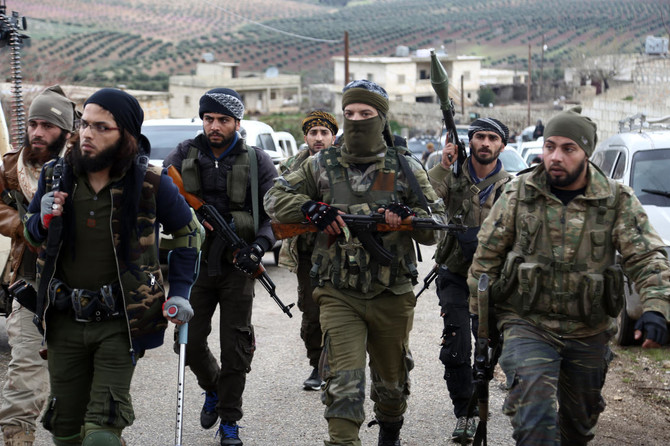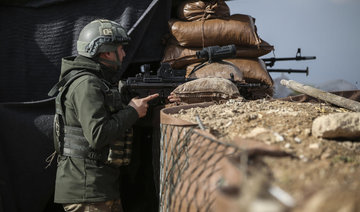BEIRUT: Turkish forces and their rebel allies have entered Syria's Kurdish-majority city of Afrin and taken control of several districts, a war monitor said on Sunday.
"Fighting is ongoing inside the city, where Turkish forces and allied rebels have seized some neighbourhoods," the Britain-based Syrian Observatory for Human Rights monitoring group said.
Pro-Ankara Syrian rebels said they "broke into the city from the eastern and western sides" to seize the neighbourhoods of Ashrafieh and Jamiliyyeh.
Civilians hiding in basements inside the city could hear fighting outside and people shouting "God is greatest", one resident told AFP.
Turkish-led forces have advanced rapidly into the Kurdish enclave around Afrin city near the Turkish border since launching an assault on it almost two months ago.
They are fighting the Kurdish People's Protection Units (YPG) militia, which Ankara considers a "terrorist" offshoot of the outlawed Kurdistan Workers' Party (PKK).
But the Kurdish militia has also formed the backbone of an American-backed alliance that has expelled the Islamic State jihadist group from large parts of Syria.
More than 1,500 Kurdish fighters have been killed in a two-month assault by Turkish forces and allied Syrian rebels on the Kurdish enclave of Afrin, a monitor said Sunday.
Most of them were killed air strikes and artillery fire, the Britain-based Syrian Observatory for Human Rights monitoring group said.
More than 400 pro-Ankara rebels had been killed since January 20, the Observatory said.
Meanwhile the Observatory says more than 280 civilians have been killed in the offensive since January 20, but Ankara denies the reports and says it takes the "utmost care" to avoid civilian casualties.
More than 200,000 civilians have fled Afrin city in the past three days, the Observatory says.
Turkey-led forces enter Syria's Afrin city: monitor
Turkey-led forces enter Syria's Afrin city: monitor

Warring factions in violence-hit Pakistan district Kurram sign peace agreement

- Rival tribes agree to surrender weapons, dismantle bunkers and not use weapons against each other
- Clashes involving tribes over land and sectarian disputes have claimed over 130 lives in Kurram since Nov.21
PESHAWAR: Warring tribes in Pakistan’s northwestern Kurram district, where tribal and sectarian clashes since November have claimed over 130 lives, signed a peace agreement on Wednesday agreeing to surrender their weapons to the provincial government and dismantle bunkers in the area, a Khyber Pakhtunkhwa (KP) government official confirmed.
Kurram, a northwestern district of around 600,000 people in KP, has been rocked by tribal and sectarian clashes since Nov. 21 when gunmen attacked a convoy of Shia passengers, killing 52. The attack sparked further violence and road closures in the district and its capital Parachinar, restricting access to medicine, food and fuel in the area as casualties surged to 136.
A grand jirga, or council of political and tribal elders formed by the provincial government this month, has been attempting since weeks to mediate between the rival Sunni and Shia factions and broker a peace agreement.
“Both sides have agreed on the demolition of bunkers and the handover of heavy weapons,” KP government spokesperson Muhammad Ali Saif said in a statement. “We congratulate the people of Kurram on the signing of the peace agreement, which will usher in a new era of peace and prosperity in Kurram.”
Saif said the signing of the agreement will ensure that normal life will be “fully restored” in the district.
According to a copy of the agreement seen by Arab News, members of the jirga and elders of both warring tribes, in the presence of district officials, agreed that all parties would abide by the agreement.
“After the signing of this agreement, the parties will not use weapons against each other,” the agreement reads. “In case of violation, the government will take action with the cooperation of the peace committee against the village or area [that violates the agreement.]”
The agreement said that people will not be allowed to display light and heavy weapons in the district, adding that there will also be a ban on collecting donations to buy weapons. A timeframe for collecting weapons from the armed factions would be announced within 15 days, it said.
Another point of the agreement said that fine of Rs10 million [$35,933] would be imposed on those who violate the terms of the deal by using weapons against each other.
It also said that all bunkers dug by the warring tribes would be dismantled within one month, while there will be a ban on digging new bunkers. It said that families who had been displaced due to the clashes in recent weeks would be rehabilitated.
The agreement said that land disputes in the volatile district would be settled on a priority basis with the cooperation of the local tribes and the district administration. Opening banned outfits’ offices would be prohibited in the district while social media accounts spreading hate would be discouraged via collective efforts backed by the government.
‘SOURCE OF CONSOLATION’
Munir Bangash, a tribal elder who is part of the jirga, told Arab News the peace agreement has been welcomed widely. However, its implementation was a challenging job, he said.
“The agreement is a source of consolation for all parties involved,” Bangash said. “Now, it is up to the government to establish its writ and ensure its implementation in letter and spirit.”
Niaz Muhammad, a member of the Shia group “Anjuman-e-Hussain Parachinar,” was also part of the jirga. He said his group was satisfied with the agreement amid hopes that peace would return to Kurram as people were fed up of constant fighting.
“We’re happy with the signing of the agreement,” Muhammad told Arab News. “Both the tribes want peace that’s why the peace agreement was reached. If there is a will there is a way.”
Saif said to ensure implementation of the agreement, people will leave in convoys on Saturday via land routes in the district.
Chief Minister Ali Amin Gandapur lauded the provincial government’s efforts, saying they yielded fruit after convincing both parties to sign the peace deal.
“I welcome this important development and congratulate all parties,” Gandapur said in a statement. “The signing of the agreement is a significant step toward a sustainable solution to the Kurram issue.”
He lauded the efforts of local administration, cabinet members, civil and security officials and specifically members of the jirga for playing a vibrant role in tackling the issue amicably.
The agreement was a clear message to elements spreading hatred between the parties, he said, adding that fighting and violence were not solutions to problems.
“If there is peace in the region, there will be development and positive changes,” Gandapur said.
Israel warns it will step up Gaza strikes if Hamas keeps up rocket fire

JERUSALEM: Defense Minister Israel Katz warned Wednesday that Israel will step up its strikes in Gaza if Hamas keeps up its rocket fire at Israel.
“I want to send a clear message from here to the heads of the terrorists in Gaza: If Hamas does not soon allow the release of the Israeli hostages from Gaza... and continues firing at Israeli communities, it will face blows of an intensity not seen in Gaza for a long time,” Katz said in a statement after visiting the Israeli town of Netivot, which was recently targeted by rocket fire from nearby Gaza.
At least 12 Palestinians, mostly women and children, were killed in Gaza by airstrikes, officials in the territory said on Wednesday.
More than 45,500 people have been killed during Israel's 15-month military campaign in Gaza.
Saudi Arabia hosts Italy’s football giants for Italian Super Cup

- Inter Milan, AC Milan, Juventus and Atalanta prepare to battle it out in Riyadh
RIYADH: The Italian Super Cup hosted by Saudi Arabia gets underway on Thursday with giants Inter Milan, AC Milan, Juventus and Atalanta preparing to battle it out for the silverware.
The four-team knock-out tournament will take place at Al-Awwal Park Stadium in Riyadh.
Serie A champions Inter Milan will play the first semifinal against the Italian Cup runners-up Atalanta on Thursday.
AC Milan, who finished second in Serie A last season, on Friday will play the second semifinal against Juventus, the Italian Cup winners.
The final will take place on Sunday, Jan. 6.
It will be the fifth time that Saudi Arabia has hosted the Italian Super Cup.
The event is organized by the Ministry of Sports and is expected to attract local and international attention from fans and media alike.
It is the latest major global sporting event to be hosted by the Kingdom as part of the Ministry of Sports’ commitment to the Saudi Vision 2030 reform program.
Ukraine halts transit of Russian gas to Europe after a prewar deal expired

- Ukraine’s energy minister said Kyiv had stopped the transit “in the interest of national security”
- Until now, Russian natural gas kept flowing through Ukraine’s pipeline network after the 2022 invasion
KYIV, Ukraine: Ukraine on Wednesday halted Russian gas supplies to European customers through its pipeline network after a prewar transit deal expired at the end of last year.
Ukraine’s energy minister, Herman Halushchenko, confirmed on Wednesday morning that Kyiv had stopped the transit “in the interest of national security.”
“This is a historic event. Russia is losing markets and will incur financial losses. Europe has already decided to phase out Russian gas, and (this) aligns with what Ukraine has done today,” Halushchenko said in an update on the Telegram messaging app.
At a summit in Brussels last month, Ukrainian President Volodymyr Zelensky vowed that Kyiv would not allow Moscow to use the transits to earn “additional billions ... on our blood, on the lives of our citizens.” But he had briefly held open the possibility of the gas flows continuing if payments to Russia were withheld until the war ends.
Russia’s Gazprom said in a statement on Wednesday morning that it “has no technical and legal possibility” of sending gas through Ukraine, due to Kyiv’s refusal to extend the deal.
Even as Russian troops and tanks moved into Ukraine in 2022, Russian natural gas kept flowing through the country’s pipeline network — set up when Ukraine and Russia were both part of the Soviet Union — to Europe, under a five-year agreement. Gazprom earned money from the gas and Ukraine collected transit fees.
Before the war, Russia supplied nearly 40 percent of the European Union’s pipeline natural gas. Gas flowed through four pipeline systems, one under the Baltic Sea, one through Belarus and Poland, one through Ukraine and one under the Black Sea through Turkiye to Bulgaria.
After the war started, Russia cut off most supplies through the Baltic and Belarus-Poland pipelines, citing disputes over a demand for payment in rubles. The Baltic pipeline was blown up in an act of sabotage, but details of the attack remain murky.
The Russian cutoff caused an energy crisis in Europe. Germany had to shell out billions of euros to set up floating terminals to import liquefied natural gas that comes by ship, not by pipeline. Users cut back as prices soared. Norway and the US filled the gap, becoming the two largest suppliers.
Europe viewed the Russian cutoff as energy blackmail and has outlined plans to completely eliminate Russian gas imports by 2027.
Russia’s share of the EU pipeline natural gas market dropped sharply to about 8 percent in 2023, according to data from the EU Commission. The Ukrainian transit route served EU members Austria and Slovakia, which long got the bulk of their natural gas from Russia but have recently scrambled to diversify supplies.
Gazprom halted supplies to Austria’s OMV in mid-November over a contractual dispute, but gas flows through Ukraine’s pipelines continued as other customers stepped in. Slovakia this year inked deals to begin buying natural gas from Azerbaijan, and also to import US liquefied natural gas through a pipeline from Poland.
Among the hardest-hit will be EU candidate country Moldova, which was receiving Russian gas via Ukraine and has brought in emergency measures as residents brace for a harsh winter and looming power cuts.
Separately from Kyiv’s decision to let the transit deal expire, Gazprom said last month it will halt gas supplies to Moldova starting on Jan. 1, citing unpaid debt. Gazprom has said Moldova owes close to $709 million for past gas supplies, a figure the country has fiercely disputed, citing international audits.
Heating and hot water supplies were abruptly cut off on Wednesday to households in Transnistria, Moldova’s breakaway region that has for decades hosted Russian troops, as Russian natural gas stopped flowing to the territory, local transit operator Tiraspoltransgaz-Transnistria said.
In an online statement, the company urged residents to gather household members together in a single room, hang blankets over windows and balcony doors, and use electric heaters. It said some key facilities including hospitals were exempt from the cuts.
On Dec. 13, Moldova’s parliament voted in favor of imposing a state of emergency in the energy sector, as fears mounted that the gas shortages could trigger a humanitarian crisis in Transnistria, for decades dependent on Russian energy supplies.
Many observers have predicted that the looming energy shortage could force people in the separatist territory to travel to Moldova proper, seeking basic amenities to get through the harsh winter and placing further strain on resources.
Moldova, Ukraine and EU politicians have repeatedly accused Moscow of weaponizing energy supplies.
On Wednesday, Polish Foreign Minister Radek Sikorski called Ukraine’s move to halt supplies a “victory” for those opposed to the Kremlin’s policies. In a post on X, Sikorski accused Moscow of systematic attempts to “blackmail Eastern Europe with the threat of cutting off gas supplies,” including through a Baltic pipeline bypassing Ukraine and Poland and running directly to Germany.
Slovakian PM Robert Fico Slovakia’s Prime claimed Wednesday that the end of gas flows via Ukraine “will drastically affect us all in the EU but not Russia.”
Fico, whose views on Russia have sharply differed from the European mainstream, has previously hit out at Kyiv’s refusal to extend the transit deal, and threatened to end electricity supplies to Ukraine in response.
Moscow can still send gas to Hungary, as well as non-EU states Turkiye and Serbia, through the TurkStream pipeline across the Black Sea.
The steady reduction of Russian gas supplies to European countries has also spurred them to hasten the integration of Ukraine’s energy grids with its neighbors to the west.
Last week, private Ukrainian energy utility DTEK said it had received its first shipment of liquefied natural gas from the US, to be delivered through a newly expanded network spanning six countries from Greece to Ukraine – and marking a significant step in reducing regional dependence on Russian energy.
Separately, overnight into New Year’s Day, Russia launched a drone strike on Kyiv that left two people dead under the rubble of a damaged building, according to the city administration. At least six people were wounded across the Ukrainian capital, according to Mayor Vitali Klitschko.
Russian shelling also killed a man and wounded two women in Ukraine’s southern city of Kherson, regional authorities reported.
Saudi Venture Capital invests in VC fund by Global Ventures

- Fund will include supply chain technology, agritech, enterprise software as a service, and emerging technologies
- Partnership underscores growing commitment to innovation and entrepreneurship
RIYADH: Startups in Saudi Arabia’s technology sector are poised to benefit from a new investment announcement by Saudi Venture Capital, which has committed funds to Global Ventures III, according to a press release.
The early-stage venture capital fund managed by Global Ventures exceeds $150 million in size and will primarily target investments in technology and tech-enabled sectors across Saudi Arabia, the Middle East and North Africa, and Sub-Saharan Africa.
The focus areas for the VC fund will include supply chain technology, agritech, enterprise software as a service, and emerging technologies such as artificial intelligence and deep-tech.
Established in 2018, SVC is a subsidiary of the Small and Medium Enterprises Bank, which is part of Saudi Arabia’s National Development Fund.
The investment is in line with SVC’s broader goal of boosting venture capital activity in the Kingdom and supporting the growth of startups and small and medium-sized enterprises in the region.
Nabeel Koshak, the CEO and board member at SVC, highlighted the strategic importance of this investment, saying: “Our investment in the venture capital fund by Global Ventures is part of SVC’s Investment in Funds Program, in alignment with our strategy to catalyze venture investments by fund managers investing in Saudi-based startups, especially during their early stage.”
Noor Sweid, founder and managing partner at Global Ventures, emphasized the significance of the investment in strengthening Saudi Arabia’s startup ecosystem.
“The market opportunity continues to be immense, with emerging technologies across platforms being built by exceptional founders continuing to shine through,” Sweid said.
The partnership underscores the growing commitment to innovation and entrepreneurship in Saudi Arabia’s rapidly evolving tech landscape.




















